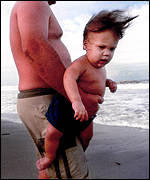Dennis: Not Such a Menace

Weathered another hurricane this weekend. Turned out to be a dud, thanks be to God. To quote Pastor Nolan Dynamite, "God doesn't seem to just let these things dissipate and disappear." In this case, however, He seems to have done just that.
That being so, I can afford to gripe about the coverage the storm received in the mainstream media. Believe me, this is the same kind of relieved griping that crewdogs indulge in after three nights of getting seriously shot at, finding that they've been taken off the schedule for the fourth night ("hey, we wanted to fly tonight (but not really...)")
Listening to Fox and CNN as the storm approached, you'd think the Archangel Michael was coming forth from the clouds, flaming sword in hand, to rend the Panhandle in twain and deliver bloody retributive justice for a generation of drunken Spring-Break bacchanalias. As the storm got close, they regaled us with scenes of Intrepid Young Reporters (and the ever-egregious Geraldo) holding onto lamp posts and screaming into their mikes of the storm's fury. The CNN "Felling of the Ramada Sign" story was one of the funniest things I've watched in a long time--and I'm no fan of reality TV. The print media was equally breathless. Here is the AP "story" that the NYT picked up:
PENSACOLA, Fla. (AP) -- Hurricane Dennis came ashore on the Florida Panhandle and Alabama coast Sunday with a 120-mph fury of blinding squalls and crashing waves that followed in the ruinous footprints of Ivan just 10 months ago.
The storm crossed land near the same state-line spot where Ivan arrived, pounding beachfronts already painfully exposed by denuded dunes, flattened neighborhoods and piles of rubble that threatened to turn into deadly missiles.
...
White-capped waves spewed four-story geysers over sea walls. Sideways, blinding rain blew in sheets, toppling roadside signs for hotels and gas stations. Sheriff's deputies were only responding to ''life and death'' 911 calls because it was too dangerous to be out on the streets.
Sheesh! Here, as Greyhawk reports in the Mudville Gazette, are the actual measurements:
Minor flooding reported near McDonalds
If you tracked the progress of Dennis using links provided in previous entries you already know the peak sustained winds and gusts associated with landfall:
Eglin AFB: 48 knots sustained, gust 72 knots - estimated
Navy Pensacola: 39 knots sustained, gust 52 knots
Crestview Florida peak gust 50 knots
Panama City, Florida 30 knots sustained, gust 48 knots
Mobile Alabama peak gust 42 knots
Buoys:
Station 42039 - PENSACOLA - 115NM East Southeast of Pensacola, FL sustained: 47 knots, gust 58 knots
Station PCLF1 - 8729840 - Pensacola sustained 35 knots gust 51 knots at 3PM CDT (no further reports)
It just wasn't that bad, as Nolan Dynamite, who was on-scene, reports:
The good news is for all the intensity that Dennis was packing; the results were minimal at best. (Thanks for the prayers.) While there was some damage, the storm came on shore quickly and did not do near as much damage as originally expected. The areas hit so hard by Ivan were spared more damage. Last I heard, the power had not even gone off back home.
So, while it was a tense day, the end seems to be pretty good. The bullet was dodged.
There was damage, but nothing like Ivan. There are three (somewhat contradictory) lessons from this reporting (three is the number thou shalt count, and the number of the counting shall be three):
1. Better safe than sorry. The MSM's breathless reporting did encourage hundreds of thousands to evacuate and thousands more in places like trailer parks to seek shelter, which probably saved several lives. No one died in the US that I know of.
2. The MSM cannot be trusted to report these kinds of phenomena accurately. They took the National Hurricane Center's off-shore forecasts of maximum sustained winds from the last eyewall regeneration cycle, which were about six hours old when the storm came ashore, and reported them as fact. Inaccurate reporting is inaccurate reporting, even if its proximate effects seem good.
In its last six hours prior to landfall, the storm passed over significantly cooler waters, entered an eyewall regeneration cycle that it did not complete, and picked up significant forward speed. All these contributed to a much weaker storm at landfall than had been predicted. If I may theorize for a moment (being the crewdogish amateur meteorologist that I am), I also think that July had something to do with the rapid loss of energy. The tropopause is higher in July than September and in areas where convection naturally occurs, I think the lower boundary layer actually contributes to strengthening of big storms (high enough to build big, but low enough to aid regeneration; more internal cyclic action--an atmospheric "sweet spot?" "High in July" may actually help dissipate storms by forcing them to expend more energy building vertically.) This may help explain why mesoscale storms are more common and more intense from Jan - May in places like Alabama and West Texas than in the summer months. Dunno. Not science--just a hunch.
3. Prayer works. I know about half of VaA's readers were in the storm's path, and so were praying for themselves as well as others! Thanks, Lord!

Monk
Update: Two were killed in FL, sadly. Still, it could have been much worse.
Update 2: Home Front Correspondent Khan responds:
All this from the man that wouldn't let me go to church Sunday morning, for fear of bad weather...I think he just didn't want to go himself, and didn't want the guilt!
Hey! I was only considering your safety!



